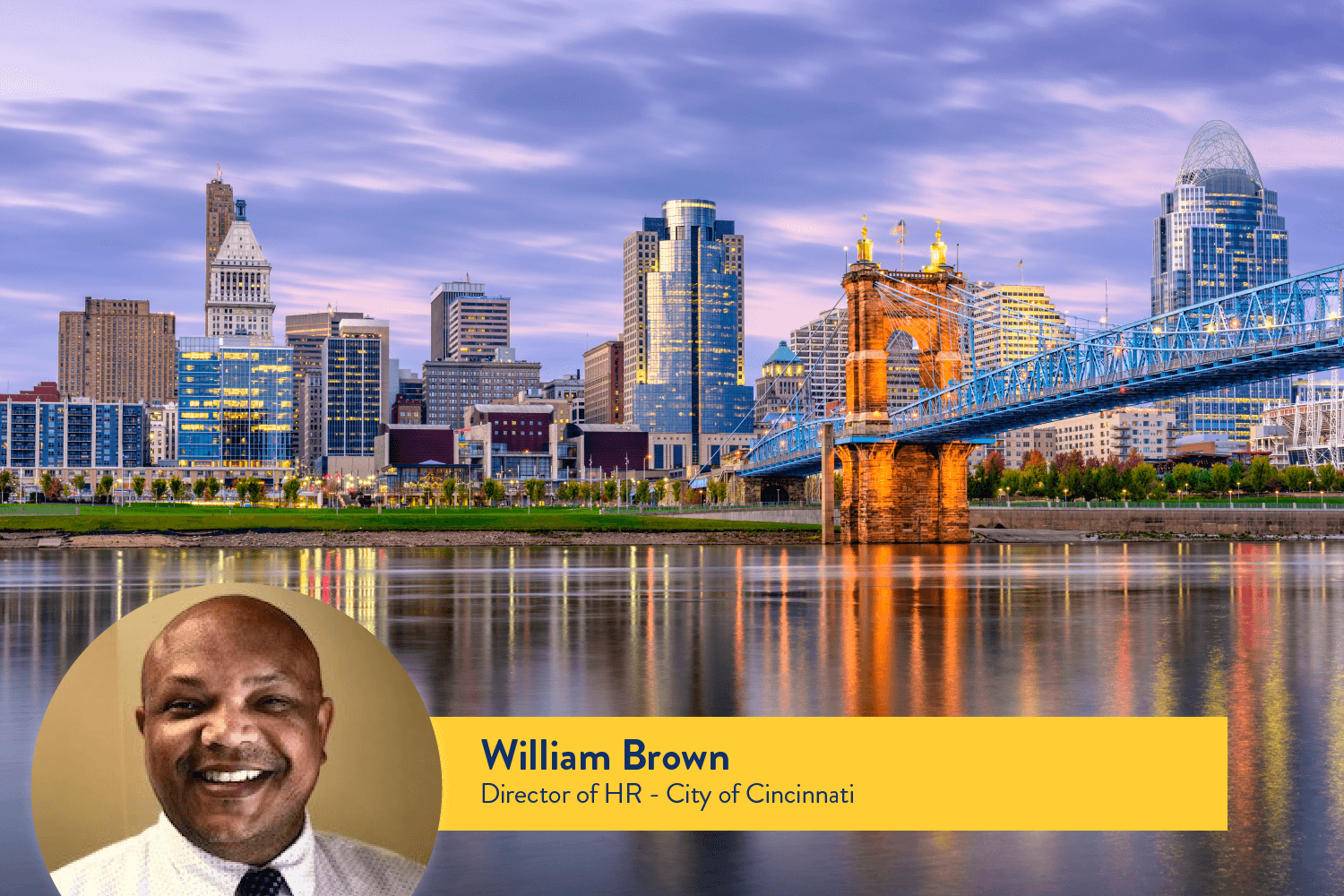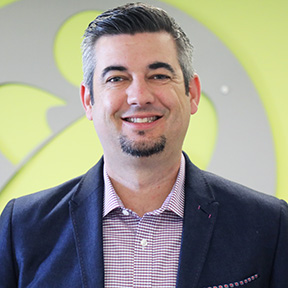
William Brown, Director of Human Resources, City of Cincinnati
In this episode of The 3rd Question, we talk with William Brown, Director of Human Resources for the City of Cincinnati. Watch to learn about the city’s "One HR" initiative and how William has streamlined processes for his organization.
Video Transcript
Ryan James:
Hello, and welcome to The 3rd Question. I'm your host, Ryan James and today we are excited to have William Brown from the city of Cincinnati joining us. William, it's really great to meet you virtually today and have you join. Thanks a lot.
William Brown:
Thank you for having me, Ryan. I'm excited about this. This is great.
Ryan James:
Awesome. Well, before we get into our three questions with you. I'd love if you could give us a quick introduction about who you are, maybe a little bit of your public sector/private sector past, and maybe a little bit about the city of Cincinnati as well.
William Brown:
For myself, I have about almost 22 years in public sector government behind me. I started in the Commonwealth of Kentucky, state government. In that 21 plus years, I've probably done a plethora of things, where it comes to purchasing, to financial analysis, and HR. I have to say that HR is by far the best part of my career. It was a role that I think chose me. I didn't choose it. I came to the city of Cincinnati as the HR director in October of 2019. So I'm well into my eighth month...going into my ninth month. Yes, it seems like I've been here for about seven or eight years, with everything going on.
Ryan James:
Well listen, let me start with our first of the three questions. It really is around the fact that you're newer in your role, as the director of HR for the city of Cincinnati. What are some of the priorities that you have brought into this role?
William Brown:
Yeah, absolutely. Coming in and being hired, there was maybe one big priority that was placed in front of me by the city manager, which was HR centralization. For long periods of time, the city has been trying to centralize a lot of their functions through the work of the office of performance and data analytics, and my office, HR...there was some data collected from the enterprise and looked at what strategies we could take on centralizing HR. The reason why centralization is so important is because in the past, up until recent, there have been separate HR divisions within the department, doing their own thing, following their own policies and procedures and then central HR, which would be my department, was just sitting there waiting for sparks to fly or shoes to drop, and then to kind of go in and clean up whatever issues that may have arised.
William Brown:
Through this process, which when I came in, I branded it One HR: Transformation To Empower, because there's going to be a lot of transformative change that was going to take place and change is scary across the board. I mean, we all know that. We're going through changes now that are very scary. We don't know what's going to happen tomorrow. So we looked at this and took it from a perspective of the three C's, which was clarity, consistency, and communication. There are HR liaisons across the enterprise that we brought in to say, "Hey, what can we do to better enhance our HR processes through you all and get them out across this enterprise spectrum?" So in doing so, we brought them in and we're now allowing them to come up with their own processes that we can use across the spectrum.
Ryan James:
So there's a lot of changes it sounds like that you're focused on and yeah, change is scary. I guess my, part B at that first question would be because of what's going on with COVID-19. Have you been able to make some of those changes quicker?
William Brown:
Well, luckily we were able to move into a phase the 1st of January before COVID really hit us hard. Actually, what COVID-19 did was speed it up a little bit. In that we were now inadvertently sending communications out to our HRLs across the enterprise spectrum and having them follow those particular policies and procedures as this thing progressed. So the next step is bringing them in and showing them or working with them on expounding upon those guidances and expounding along those procedures, but it is working.
Ryan James:
That's awesome.
William Brown:
So, yeah it has proved to be successful.
Ryan James:
Well, that's a nice segue because my second question really comes around the challenges that cities face and maybe Cincinnati has some of these too, but really what, some of the challenges are that you have when it comes to the communication. Now you were disparate now you're centralizing, but around communicating, empowering, and really providing, even for the whole employee base that you have at Cincinnati. What are some of those challenges from an HR perspective?
William Brown:
Well, so the challenge is there's been a huge stigma around telecommuting in the public sector. That has been a huge absolute no-no for years. How can you work from home when you work for the people? You need to be boots on the ground, you need to be there and in a lot of the roles that we play in public sector government, you do have to have boots on the ground. You have to do that, but what we're finding out more and more is that we have a large percentage of the employee population that can work from home and work from home successfully. So the biggest challenge was changing the minds of those to say, "Hey, we have to do this. We have to implement telecommuting because we have to keep our folks safe." Another challenge that we faced was having to furlough employees very quickly because of our budget deficits and then realizing who had the critical role, who had the noncritical role and then who had a telecommuting role.
William Brown:
Out of those that were developed, those non-critical, non telecommuting roles were the ones who had to be furloughed. We had no work for them to do. That was very difficult, out of 6,500 employee base, 1700 of them were furloughed...and we just recently brought everyone back. Now majority of those who were furloughed were part time employees because our summer months are coming upon us. So we're hiring part-time folks for our parks and recreation departments. Right, and so a lot of those folks were not able to start. However, we did not fire them or terminate them. We just simply furloughed them and said, we will call you back when we're able to reopen. So on June 28th, we were able to call everyone back in and so that had been proven to be a very challenging and daunting task.
William Brown:
Now on the technology perspective, what we're looking at now is that how can we efficiently and effectively provide the resources that our folks who are telecommuting the technology advances that we need. So now we're looking at those and one of those is our HRIS enhancements. So we are in the process of putting teams together. Well, there's a team already together, but we are actually revising that team because we are also entering, due to a budget deficit, something called E-RIP, which is the emergency retirement incentive program. So we're going to have about 500 or more eligible employees for E-RIP. So then that also brings in another challenge because that means our position numbers are shrinking and we're looking at reorganizing departments to run in a more efficient way because we have to have these budget cost savings and so we are identifying the positions that must be filled or backfilled once these other employees begin to exit.
Ryan James:
Well, lots on your plate. A lot of things going on, but we've come to the third question and today, if you see over my shoulder here, and our viewers don't see this until I bring it up to camera. I've got some time-machines on my shelf back here, and I'm going to pick the DeLorean from Back to the Future for you.
William Brown:
Very familiar.
Ryan James:
So my question for you, William, is if I gave you the DeLorean and said, "Hey, you can go back to any point in your public sector career and give yourself some advice or change how you did things. What would it be and why?"
William Brown:
I would go back to the beginning in 1999, 1998. Yeah 1998. I would go back to the beginning and I would probably mentor myself to be more empathetic at that time and to realize that you are serving the people who serve the people. That is probably where I would go to say that you're going to have some ups and downs in your career, but don't get frustrated, take your time, because eventually you will become successful. At that given time, I didn't think that. I didn't think that I would be in public sector government this long. I didn't know that I would be in HR. However, I think that I would have started my HR career sooner, and that would have been something else I would have gone back and said, okay Human Resources is where you need to be. This is your mindset, this is your bailiwick, this is where you have your most strengths. So utilize them and be the best that you can be. So that's probably what I would say.
William Brown:
There's one of the things that I think I would say to my young self would be--"exist to live and don't live just to exist." That is something that I would definitely tell my young self. For so often throughout my years in my professional career, I have really just existed or at least I felt that way and it has been up until maybe, I don't know, a year or two ago. It was like, you know what? I'm not going to just live to exist anymore. I'm going to exist to live, and that means exploring and doing so much more with the knowledge and experience and the abilities that you have within you to change the world, to change your little environment, to change whatever you can make a change and make a positive difference in.
Ryan James:
I love it. Well William, I really appreciate the time you've been able to share with us today on 3rd Question. It's been great having this conversation. For our viewers if you want to go to the3rdquestion.com to see this interview, and also to see other interviews with public sector thought leaders, I encourage you to do so and subscribe there. William, take care of yourself, thank you for your public service with the city of Cincinnati, and really appreciate your time.
William Brown:
Well thank you so much and I enjoyed this and thank you for reaching out. This has been great.
Ryan James:
It's been great. Bye-bye.
William Brown:
Bye-bye.

